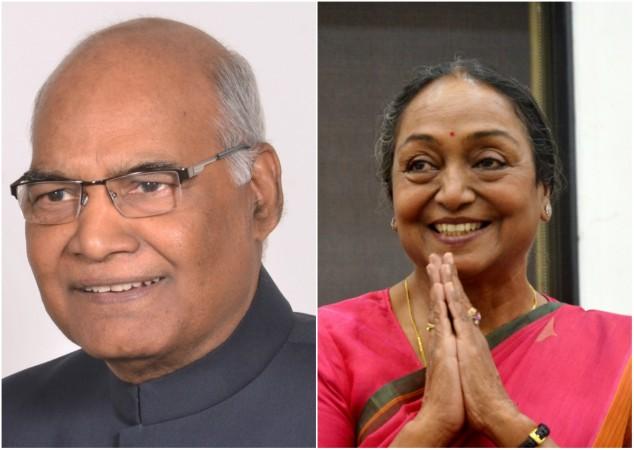Ram Nath Kovind, the NDA candidate, has been elected the 14th President of India. He beat his opponent, Meira Kumar of the Congress, by getting 65.6 percent of the votes in counting that took place on Thursday, July 20.
Kovind was the favourite to win the election from the word "go." He remained the favourite even as election concluded on Monday, July 17.
With Kovind's election, which was officially announced at 5 pm on Thursday, India gets is second President from among Dalits, the lowest of caste among Hindus.
The first was KR Narayanan, who had also been appointed President under BJP rule, and held the post from 1997 to 2002.
Cross-voting helped NDA candidate?
While it was almost a given that Kovind would get a majority, it seems that cross-voting by an apparently-united but overall-fractured Opposition helped him wrangle the top post with much more ease.
At least six Trinamool Congress MPs had made it amply clear that they had voted for Kovind, even though their party had thrown its weight behind Kumar.
Now it seems that even some Congress MPs and MLAs could have voted for Kovind. One example, as cited in an NDTV report, was the Shankersinh Vaghela faction of the party in Gujarat had also voted for Kovind.
Some sources also speculated that Samajwadi Party leader Mulayam Singh Yadav and his trusted aide Ram Gopal Yadav had also voted for Kovind, and got some other loyalists to swing that way as well.
A PTI report from earlier this month had quoted a BJP leader, without naming him or her, as saying that they were "not ruling out" cross-voting from the Lalu Prasad-led RJD as well.
Bhupender Yadav, a BJP MP from Rajasthan, seemed to confirm this cross-voting when he told news agency ANI on Thursday: "I would like to thank the 116 MPs and MLAs of the other side who listened to their conscience and voted in favour of Kovind ji."

Big win for BJP
The election of Kovind by a comfortable margin may have been a given right from the beginning, but the BJP will still consider this a big win, more so because of its psychological ramifications.
The President may be the titular head of the country, but Kovind's election will be considered yet another example of the Modi wave working for the saffron party.
It will also take the BJP yet another step closer to claiming that the party's losses in the Bihar and Punjab's Assembly elections were in no way setting a trend or signalling the end of the influence of Prime Minister Narendra Modi over the people.
Greetings pour in
That Kovind had won the election was known well before the counting finished, because he had crossed the halfway mark. After the official announcement was made, greetings poured in from him from all quarters.
One of the first people to greet him was Prime Minister Narendra Modi, who shared two pictures to show that he and Kovind went way back.
20 years ago and the present…always been a privilege to know you, President Elect. pic.twitter.com/IkhnOtYf8N
— Narendra Modi (@narendramodi) July 20, 2017
Even Meira Kumar congratulated him, saying: "My best wishes are with Kovind ji as it has fallen upon him to uphold the Constitution in letter and spirit in these challenging times."
Congress licks wounds?
The loss of Meira Kumar, who was a much-better-known face than Kovind, will rankle the Congress, even though it was expected. Kumar had actually been the speaker of the Lok Sabha, while Kovind's last assignment was the governor of Bihar.

Kumar and the Congress had tried to corner the BJP in many ways, but Kumar using party ideology as her main weapon did not turn out to be as fruitful as some might have thought.
The Congress will now look to deliver a big blow to the BJP in the upcoming Assembly elections in Gujarat, the home state of the prime minister.
The BJP has been having a tough time of late in Gujarat because of the Patel quota agitation stir spearheaded by Patidar Anamat Andolan Samiti head Hardik Patel.














